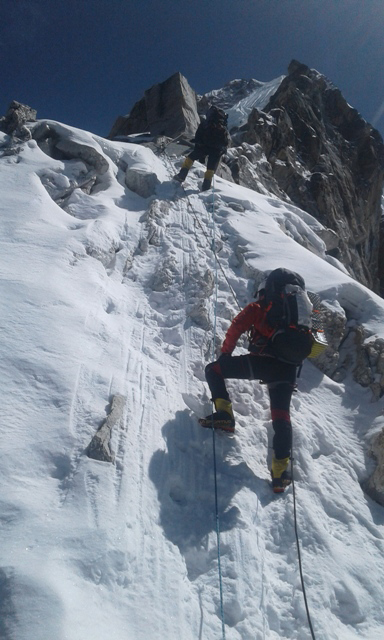
Mountaineering in Nepal is an almost one-century-old activity. Nepal is rich in culture and nature. It is famous as the home of the highest peak on Earth, Mount Everest, or ‘Sagarmatha’ (Mother of the World in Nepali). This is not it! Most of us have not realized that the North of Nepal is the backbone of the Himalayas where lies eight of the world’s giant peaks – mountain Everest (8848m), Kanchenjunga (8586m), Lhotse (8516m), Makalu (8463m), Cho Oyu (8201m), Dhaulagiri I (8167m), Manaslu I (8163m) and Annapurna I (8091m).
The Nepal Himalayan range is believed to have 1310 peaks that rise between 6000m to 8848m above sea level. It has officially declared 414 peaks open for mountaineering in Nepal. Some peaks have crowds of climbers, some rarely climb, and some have never been climbed before among 414 peaks. There are so many mountains unclimbed in the Himalayas of Nepal.
Annapurna I (8091m) was the first to successfully summit a thousand peaks in the world in 1950 by a French expedition with Maurice Herzog as a leader. Annapurna is the most sales book written by Maurice Herzog. Annapurna is known as Killer Mountain in mountaineering history. Mountain Everest was first successfully summited by Edmund Hillary and Tenzing Norgay in 1953 with a British Expedition led by John Hunt. It was massive news that humans had conquered the highest peak on Earth. Then, all over the world, mountaineers were lured by the lofty mountains and the challenges of climbing virgin peaks in the Himalayas of Nepal. The Sherpa ethnic have been involved in mountaineering since 1953. Most mountaineering expeditions would not go up without Nepal’s loyal, hardy, and extreme Sherpas. Today, many other ethnic groups are also involved as mountaineering crews, generally called Sherpas.
We handled all logistics for an expedition that would spend months in the Himalayas, including food and gear supplies, mountain guides, cooks, and porters. We employ a mountain guide certified by the International Federation Mountain Guide Association (IFMGA) for the expedition. Mountaineering is always a high-risk activity in the Himalayas. Our guides are highly experienced in extremely high-altitude environments and well-trained to climb mountains and minimize risk.
Any peak above 6000m is illegal to climb in Nepal if the expedition group does not obtain climbing permits from the Mountaineering Department of Nepal. International companies or private expedition groups must contact local companies to get peak climbing permits in Nepal. The local company has to process peak climbing permits before the expedition groups arrive in Nepal. They have to pay royalty fees based on the elevation of the peaks, and a garbage deposit is mandatory for each expedition. It’s compulsory for insured members of the expedition group and all the crews to get mountaineering permits in Nepal. We take care of all paperwork to get mountaineering permits under the current Nepal Tourism Act (Provisions relating to Mountaineering).
John Hut led the first Everest Expedition in 1953. It was the first successful British expedition through the Khumbu Icefalls and the South Col route. His two members, Sir Adman Hillary and Tenzing Norgay, conquered the tallest peak in the world on May 29, 1953. After 1953, the national and International mountaineers set historic records […]
view detailsThe eye-catching mountain Ama Dablam (6812m) is in the Everest region, Nepal. It is a mountaineer’s favorite because the climbing route is technically challenging. Mountaineers often go on an Ama Dablam expedition to prepare for other peaks with 8000m expedition plans. It is also the trekkers’ favorite mountain to look at when they are trekking. […]
view detailsThe Manaslu expedition is Nepal’s third most popular eight-thousander mountaineering activity, behind Everest and Lhotse. The mountain formerly known as Pung Gyen and Kutang I is now called Manaslu, and it is 8,163 meters high. The name “Manaslu” comes from the Sanskrit word “Manasa,” meaning “Mountain of the Spirit.” As the eighth tallest peak in […]
view detailsWe organize the Himlung Himal Expedition in the heart of the Peri Mountain Range, Manang, Nepal. This captivating mountaineer attraction is an unforgettable journey through awe-inspiring landscapes. Discover the untouched beauty of the Himalayas, where pristine snow-capped peaks, lush vegetation, and breathtaking panoramas ignite a sense of adventure and tranquility within every mountaineer. High Camp […]
view details